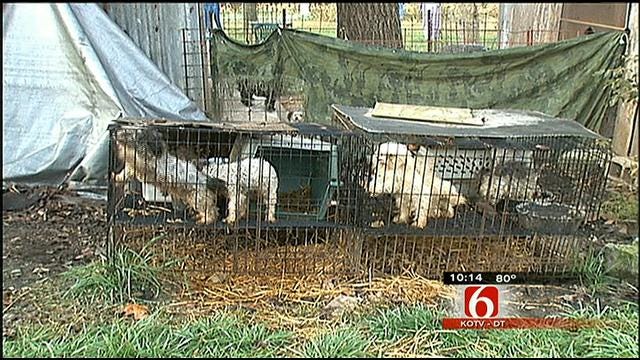Critics Say New Pet Breeder Regulations Are Set Up To Fail
The latest change to state regulations gives responsibility to inspect and shut down puppy mills to the Department of Agriculture, but it didn't give them any funding to get it done.Thursday, July 19th 2012, 11:00 pm
Oklahoma is known for having some of the worst puppy mills in the country, breeding dogs in inhumane conditions and spreading disease to unsuspecting buyers.
State laws have been passed to stop the puppy mill problem, but those laws have been changed.
The latest change gives responsibility to the Department of Agriculture, but it didn't give the agency any funding to get it done.
Some say the new regulations are set up to fail, and puppy mills will continue to plague our state.
Inspectors with the Oklahoma Department of Agriculture have regulated the livestock industry for decades.
But puppies and kittens are not their forte.
"I honestly don't know what we're going to have to do just yet," said Bill Golightly.
Golightly has been a livestock inspector for five years and in that time he said he's seen the inspection staff cut in half.
He said state inspectors are already stretched pretty thin and he can't imagine what it would be like if they also have to inspect breeders.
"It's going to be a handful," Golightly said.
12/8/2012 Related Story: Oklahoma Puppy Mill Owners Dodging New Regulations
With an estimated 1,000 to 1,500 breeders to inspect, and no extra money with which to do it, a spokesperson for the department said they'll have to get creative, which is nothing new.
"Sometimes we get a program that doesn't give us enough money to do it, but it's something you have to roll with it," said Teena Gunter of the Oklahoma Department of Agriculture.
Right now the department hopes it won't have to use its livestock inspectors, but instead will find enough money to hire one new full-time breeder inspector and possibly contract with local veterinarians as needed.
One of the challenges, however, is the fact that most of the breeders (an estimated 1,000 to 1,500) are not currently on record with the state. They have to be identified and pulled into the system.
"We anticipate that one inspector should be able to handle that," Gunter said. "Again, time will tell. We are going to learn about this program as we go, also."
State Representative Brian Renegar is a veterinarian in McAlester who pushed for the Department of Agriculture to regulate breeders.
Jennifer Loren: "Do you think that one inspector is going to be enough for the entire state?"
Rep. Brian Renegar: "No, I do not, and I think the Department of Agriculture will figure that out pretty soon."
He said livestock inspectors will have to help out to get the job done.
He's confident they can do it without any funding and, in fact, he thinks breeders will be more willing to be regulated under those types of inspectors.
"I think they have a little more trust with the Department of Agriculture," Rep. Renegar said.
But others are not so confident.
The Director of the Oklahoma Humane Society, Christy Counts, has been on the front lines of this battle for years, and says it appears the state still isn't taking this regulation seriously.
"This is such a huge problem in Oklahoma," Counts said. "We've got regulation happening all around us and it's time for Oklahoma to step up to the plate and do it well ourselves."
Counts says lawmakers' failure to fund the program makes any meaningful regulation impossible.
She says animal advocates will monitor the situation, and if they don't like what they see, they will take this issue to the people with a ballot initiative.
"I mean at the end of the day if we can't get it done through the capitol we'll get it done through the people," Counts said.
If a ballot initiative passed, it could create even stiffer regulations for breeders and would be written into the state constitution.
Our Oklahoma Impact Team will continue to monitor the regulations under the Department of Agriculture.
The agency will have a few months to see how things go and then will rewrite permanent pet breeder regulations later this year.
Click here to complain about a breeder or puppy mill
More Like This
July 19th, 2012
September 29th, 2024
September 17th, 2024
Top Headlines
December 14th, 2024
December 14th, 2024
December 14th, 2024
December 14th, 2024












